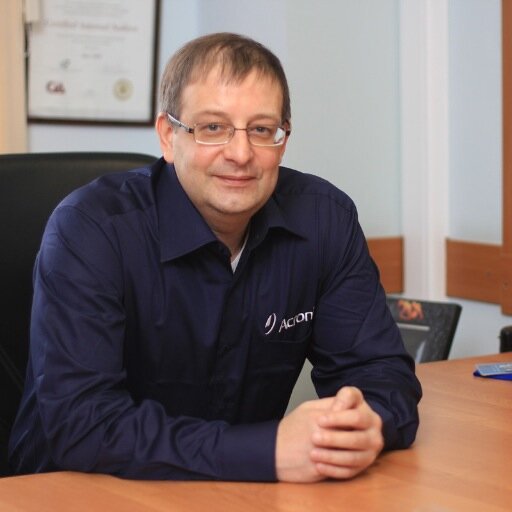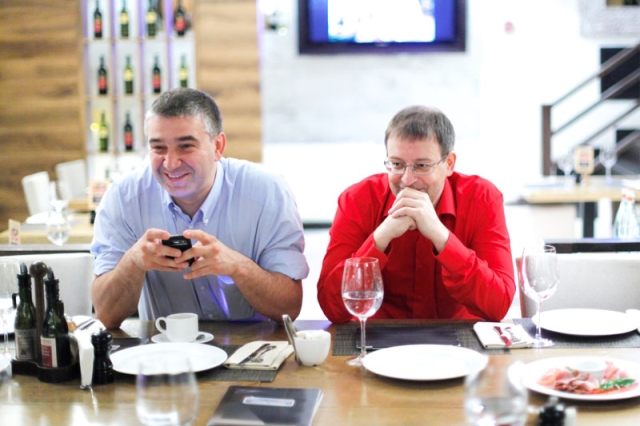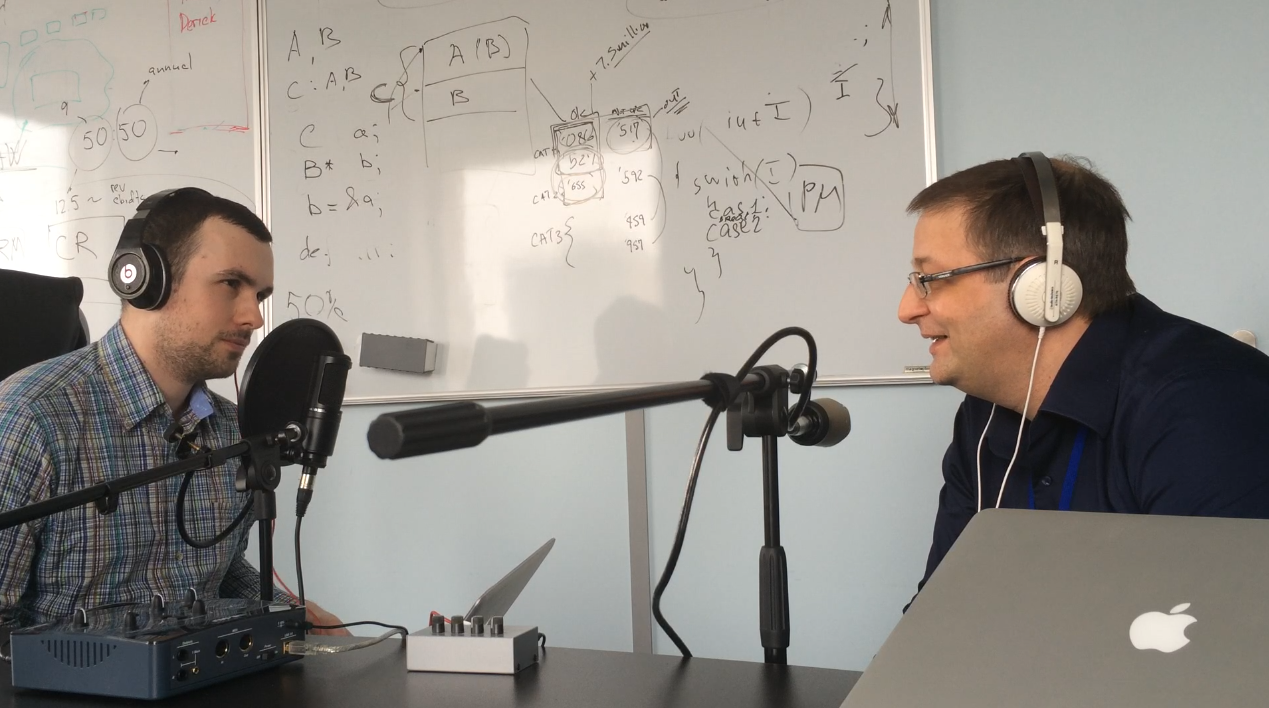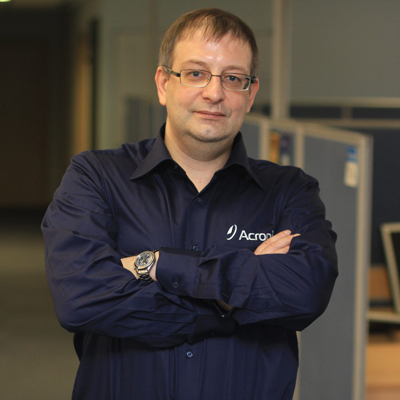Feature # 2 - Podcast on entrepreneurs and current trends in the IT ecosystem
 Hello! We decided to prepare a transcript of a rather interesting release of one of our podcasts specifically for Habr readers.
Hello! We decided to prepare a transcript of a rather interesting release of one of our podcasts specifically for Habr readers.In this issue of the “Characteristic” show - a show about entrepreneurs and current trends in the development of the local and global IT ecosystem - [from the creators of the Metric show and the Traffic show] ), co-founder and senior vice president of software engineering and development for Acronis .
In addition to the transcript, we also provided links to the audio version of the conversation with Stanislav.
')
Podcast audio:
Listen to the issue and subscribe to the Show Feature on the iTunes Store
Subscribe to RSS
Download Release Audio File
[All our podcasts are in the same audio tape on the iTunes Store]
Podcast transcript:
Dmitry Kabanov: In preparation for this release, I could not help but notice the fact that your interviews, everything you say is mainly aimed at answering questions that you periodically ask about technology, about startups, about investments, and today I decided to try to discuss a little bit of a new topic that focuses on remote work and technologies that support it. I think this is a very interesting [topic] for both employers and employees themselves, who are now looking for new job opportunities both domestically and abroad. First of all, I would like to start from the place, objectives and goals of Acronis today as a company. I think that would be right and most interesting.
Stanislav Protasov: Acronis is now continuing to develop those technologies that have always formed the basis of its value - backup technology. We are improving, in a certain sense, polishing what we have. In addition, Acronis has a rather interesting, promising new direction, which we call Acronis Access - mobile data access, which is becoming more and more relevant today. [Why?] Because, well, [for example], last year, as I recall, for the first time in history, the number of deliveries of personal computers and laptops fell compared with 2012. The number of shipments of tablets has, in fact, surpassed the supply of laptops, and it is more or less clear that the number of mobile devices will only increase and [they will be] the main devices for accessing information in the world. Therefore, the question of how to access information that may be confidential, secret with these devices is very, let's say, scrupulous for employers' companies, has become very acute in the last couple of years. Acronis Access is one of those solutions that cope with this problem. Acronis is now moving in two directions: we combine our traditional technologies with what we call Any Data Technology, i.e. technology to access any data from any device, and add products that allow secure remote access from mobile devices.
Dmitry: I think [that] this is a very interesting direction, of course. But it turns out that in order to invest the main efforts in this direction, you need to feel like maybe a more lightweight company, revive the team again and invest energy in a new direction.
Stanislav: Well, I don’t really understand how to revive a team without resorting to any special means. But generally speaking - yes. [Recently] Sergey Belousov, one of the founders, returned to the company as an executive director. The company had certain problems caused by, let's say, not the optimal course of the previous top management, respectively, Sergey is now rebuilding the company's strategy, rebuilding the company's marketing, product line and even company organization, i.e. Now we are actually building a company around four business units: consumer products - products designed for end users who want to protect their data, corporate products for companies, what is called small & medium business, and the cloudy direction, we have it call cloud naturally (...) and here is the last business unit that is just the Acronis Access or mobility business unit.
 Dmitry: I just read an interview with Sergey Belousov, where he commented on one of the initiatives put by the Minister of Communications Nikolai Nikiforov, in which the goal was formulated and it was said about ensuring the possibility of maintaining remote work. It seems to me that this is an important task for the regions, and here we are faced with the fact that the number of telecommuters is growing all over the world - both in the United States, and in us, and in the West. For example, in the United States for 6 years from 2005-2011, their number was about three million people, various independent companies write about this, such as, for example, “37 signals” (Basecamp): they published a whole book on remote work. And now we must anticipate the challenges that may be faced by both employers and beginners and employees who are just coming to this industry. Maybe there are some basic risks associated with working with data, with security, as we have noted earlier, taking into account new technologies?
Dmitry: I just read an interview with Sergey Belousov, where he commented on one of the initiatives put by the Minister of Communications Nikolai Nikiforov, in which the goal was formulated and it was said about ensuring the possibility of maintaining remote work. It seems to me that this is an important task for the regions, and here we are faced with the fact that the number of telecommuters is growing all over the world - both in the United States, and in us, and in the West. For example, in the United States for 6 years from 2005-2011, their number was about three million people, various independent companies write about this, such as, for example, “37 signals” (Basecamp): they published a whole book on remote work. And now we must anticipate the challenges that may be faced by both employers and beginners and employees who are just coming to this industry. Maybe there are some basic risks associated with working with data, with security, as we have noted earlier, taking into account new technologies?Stanislav: Certainly. First, I would like to say that the initiative in question is an initiative to connect the farthest corners of our country to the Internet, which, according to various estimates, will bring the broadband Internet to an additional thirty million of our fellow citizens. In general, in terms of scale and effect, this can probably be compared with the construction of highways or railways throughout the country; one can say that this is, in some terms, the BAM of our time.
Dmitry: Well, such an engine of the economy.
Stanislav: It really is the engine of the economy, because it allows people who are sitting somewhere deep in Russia to do business or work for some companies that would otherwise not be able to notice or hire them, and [ in this sense, of course, this is a very good initiative. There are risks naturally, and there are risks both technological, and connected with the level of education of these people and with the ability of people to work remotely. In general, this is a very difficult question - the remote work of employees. First of all, employees who work in the same office are forced to communicate in one way or another: as a last resort in a smoking room, not to mention some meetings, talking over a cup of coffee, etc. etc. When a person is deprived of this, he loses a sufficiently large amount of information. This is the first problem, i.e. a remote employee is less involved in the work of the company, he has less information, and the information allows us to make the most correct decisions. The second problem is that remote work, moreover, requires a certain level of human development, if you want. What I mean is: when I need to do something, and I sit at home at the computer, where I have distractions, [for example], children and TV, to force myself to be much harder than in the office, where nothing works interferes. I'm not talking about such things, that for [efficient work] a person needs some kind of space that many people in our country cannot provide for themselves. We all know that we do not have a very high number of square meters of housing per person. That is, problems, purely organizational-human field, a huge amount. But besides this, there are technical aspects, because if, say, a person works in an office of a medium-sized company, I don’t even take any large company, then data security issues, anti-virus check issues, non-working equipment issues are usually solved by IT- the department where they work, especially in our country, are professional system administrators able to diagnose and fix problems that arise. When a person stays at home for a few hundred or thousands of kilometers [from the office] and something doesn’t work with the computer or a message pops up on the screen, “enter your phone number and send SMS there, otherwise we will not open this screen”, he is usually not able to cope with such a problem on his own.

Dmitry: It turns out that this creates a number of new tasks for the company.
Stanislav: Certainly. Worse, usually any company and any IT department ensures perimeter security, i.e. [fights] c antivirus threats, hacker threats, etc. etc. With computers of remote users, everything is much worse, because there may be some rootkits, viruses that simply transfer data to an unknown server in an unknown country.
Dmitry: Well, of course, physically it is much easier to put everything into, roughly speaking, in one building, fence, guard, etc.
Stanislav: Certainly, absolutely. In general, the safest computer is locked in a room without any Internet connections, and a machine gunner sits at the entrance. This is known from the beginning of the development of the industry, and, accordingly, the issue of access and preservation of confidentiality of information plays a huge role. Well, it is clear that if I, say, a lawyer who works remotely for a company from Moscow, but [I am], relatively speaking, in Khabarovsk, and working on a contract between my company and some other large organization, then those conditions which [spelled out] in this contract can be very, very confidential for my employer, i.e. if they get on the Internet, the deal simply does not take place.
Dmitry: The whole business can be put at risk.
Stanislav: Fortunately, such things do not happen very often, but yes, [all the same happen]
Dmitry: Just the fact of compromise can jeopardize trust [to the company].
Stanislav: Of course, of course, I can [tell about an incident I was reading about 15 years ago, even when faxes were in fashion. There was such a story that Oracle corporation employees sent a quota to the wrong client, simply made a mistake, dialed the wrong number on the fax, and the fax with the offer went to another company, and there was some kind of fantastic discount well over 50 percent. This information got into public access, and Oracle had serious enough, let's say, at least reputational costs, because they now had to explain to all customers, “but why should I pay the full price list when you are give a quota with a discount of 70 percent. "
Dmitry: Yes, even if you look from the point of view of an ordinary employee who is trying to solve some problems, working as a freelancer or a remote employee, you can recall the incident with Dropbox earlier this year, when a lot of rumors appeared that some security was compromised a group of anonymous hackers. In the future, the company denied this information, [stating] that technical work was simply [conducted] during this period of time, and [therefore] it became possible to make such an information reset. Anyone who found out about this somehow thought about the fact that [precisely] they are stored on Dropbox or iCloud analogues, cloud storages, how they approach these issues, because even any typical employee, man in the street and the person, in principle, Already now it stores quite substantial and significant information for itself in cloud storages - these can be documents, passport scans, personal photos, etc., i.e. quite sensitive information, both reputational and literally economic. It may be, from your point of view, [it is worth repeating] what the everyday person, the philistine risks, working with cloud vaults. I think that we have no task to scare everyone with some kind of horror stories, but still there are some risks associated with this.
Stanislav: No, well [of course], it is important to understand here that Dropbox is just a cloud file sharing service, it is, in general, not a repository, i.e. I don’t remember that Dropbox promised somewhere that the information you put in there will always be there. No, it is really convenient some external storage, but in no way does it guarantee the inviolability of your information. This is one of the most convenient ways to share information with some of your counterparties, friends or someone else, but Dropbox security as it was not intended as a cloud storage for corporations, in general, for end users. . For example, [consider] such a simple fact that you can put a file on Dropbox that any person in the world can access for a while. But imagine that this is a draft order of the president of any country, [in this case it is] not a very reasonable way to store information. And I think, from this point of view, in terms of cloud data storage and in terms of cloud backups, of course, Dropbox will slowly [displace] solutions such as, let's say, our cloud version of Acronis backup, because it is First, it allows you to have multiple backups, i.e. You can take not only a specific document, but also any of its revisions. Secondly, depending on the provider, this data can be encrypted, and thirdly, access is tightly controlled.
Dmitry: That is, there are already guarantees.
Stanislav: Of course, the same with Acronis Access. Why does it represent a very attractive solution for many companies? Because, both on your servers within the company, and on the client device, the information is encrypted, and you control with what programs, with the help of which applications and which users can see this information. From this point of view, I think, [inappropriate] to call Dropbox a network storage, this is a file sharing service. About 10 or 15 years ago, when network technologies began to appear, probably [after all] 20 years ago, in almost any organization there was a novell netware server, which was an organization's file sharing service - different people from different departments put [there] their documents and could edit, watch, correct, etc. etc. Dropbox in some way is a new cloud novell newtware.
Dmitry: It turns out that even an ordinary person in the course of his work encounters devices, smartphones, cameras, video cameras, a bunch of tasks, when he needs to ensure the safety of especially important information, [such as], for example, a family photo album or a video recording then a special trip. I always do not want to lose such valuable things, and usually it all ends with the fact that people run with their hard disk to various handicraft services, where they are offered to perform some kind of repair actions costing 30-40-50 thousand rubles. It would seem that if you use simple mechanisms, simple tools that already [exist], you can get just these guarantees and keep the valuable things that you have and do not want to lose.
Stanislav: I would share a little bit of confidential information and information that I want to keep, because experience shows that just for most people a set of their own photos is, in some respects, a question of some kind of fetish, rather than confidential information.
Dmitry: Now it is already.
Stanislav: People are happy to [share] them. Even if these are some slightly compromising photos. But this does not mean that the user does not need them, and this does not mean that for people the preservation of this information plays no role. Of course, the development of digital technology and the development of the Internet have dramatically increased the number of photos that a regular user has. I've seen such a good demotivator, [where] the American astronaut and the girl taking pictures of themselves in the bathroom were [depicted]: “The American astronaut flew to the moon - made 3 photos, went into the bathroom in the morning - made 84 photos”. Indeed, the number of photos, videos and other materials has increased dramatically, and for people they are of great value, and people are willing to pay money for the restoration of this information, so services such as storing this information somewhere in the cloud will be in demand, and they appear now. Indeed, quite a few people are now offering them, technologies are gradually improving. I now think that Acronis for these purposes today probably ...
 Dmitry: Any decisions and answers?
Dmitry: Any decisions and answers?Stanislav: Even not that there is a solution, there is probably the best solution in the world, because, in essence, we started creating user data backups 15 years ago with this topic and improved it all 15 years ago. Cloud [technology] is quite a new thing. Where you backup, this [something] is remote, does not belong to you and is provided to you as a service, but the principle of saving data really hasn't changed much.
Dmitry: But it seems to me that here [there is] a very important advantage - the possibility of a clear understanding of the devices that are used for this copying, because very many people like simply copying backups manually to some external small repositories of the same family, children's albums with photos.
Stanislav: I am sure that it is simply from the lack of convenient applications. First, watching the average user, it’s easy to notice that he doesn’t want to copy anything, he wants his data to be protected, and if he manually copies some specific files or folders, it’s just that he doesn’t know how different they can be saved. This is inconvenient, for example, if you have 5,000 photos, [then] copy them manually [a laborious process].
Dmitry: Watch for updates every time ...
Stanislav: Firstly, every time to follow, to understand in which folder you have new photos appeared. Secondly, you started copying, 3,000 were copied, and then everything stopped copying - what to do? Start all over again? Calculate where you left off? Or how? Therefore, the decisions that will take on this part of the work, i.e. will determine the difference between the data that you have already been saved and the new data, copy [to] some external, not necessarily even cloud [storage], maybe just for some additional hard drive or flash , , . .
: , 7 , 100 , . [ ] [ ], , …
: , ! , . , , , , 7 . , [ ] , , .
: , . Unitrends, , : 40% , 29% – 13% – , , 18%. , , [] 25% . [] , , . , , – HDD, SSD .. -, , , : , , ?
: , SSD , , . , [] - , - , SSD [] , , . , SSD , . , SSD ? No , [, ] SSD – . , SSD, 5 100 , . , , , . , - -, , - .. .., . SSD , , , , , , , -.
: , . , , SSD , , , []. , , 100 , .
: , , , value SSD — , , .. .., , , SSD , , , .
: [ ].
: , , [ ], , . , , , SSD , , , .
: [], , , ? , Unitrends, , 93% , , . : 2009 JournalSpace , , - , , .
: , , , . , , -, , - – , .. c - [ ], . , -, – , « ». , , , , , , - . , , , . [], , «», , , , .. , .
: , , , , , , , , , . , : hotels.com 240 [] , Ernst&Young , Starbucks . , .
: Linked in password- , .. [] . Yes, sometimes.
: , , , , , , , . , ? LinkedIn, Starbucks, (…)
: , , , , [], damage-, [] - , Dropbox, [], Dropbox , , [] - , , . , , , . , , , : -, , -, , , , , , . , Amazon, « ?» :« , , [] , , ». ? , , , , , - . - , .
: ?
: . , , -, , - , - . , - , [ ] , , , - , , , , .
: .
: , , , .. - , . - , . [ ] IT-, - . , - . , , , , — , - - , .
: , , - , , , - ?
: [ ]: . . [ 25%...], , , , , , . - , [ ] – , - , . , , , , , [] , …
: , - , , , [] …
: , — , , - , [] ! – , , -, . , , . , . , . , , , . , - . [, , ], , [] . - , [] – , , , [], , , : , , , . , . - , , , , , , [] , , , , .
: , , , , , - , , , …
: , [ ] , [ ] , . , , – Google Glass, , . , , , , , - , , , …, , , , , .
: , , , , ..
: !
: , .
: !
[.] , :)
Source: https://habr.com/ru/post/224875/
All Articles